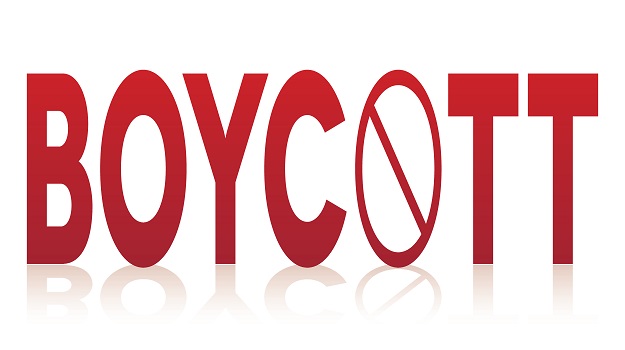(单词翻译:单击)
听力文本
From VOA Learning English, this is Words and Their Stories.
Each week we report on words and expressions commonly used in American English. We explain their meanings, their roots and how they are currently used.
Today we talk a word that comes to English through the Irish. That word is boycott.
Boycott can be used as both a noun and a verb. As a verb, boycott means to refuse to do something as a form of protest. People who boycott something are often looking for social, economic or political change.
As a noun, the word boycott has a somewhat different meaning. People stop using goods or services during a boycott until changes are made.
In fact, that is just how the word entered the English language. It began with a man's name.

In the mid-1800s, a young man named Charles Boycott (1832-1897) served in the British army. After retiring, he worked as a land agent for the owner of a large country estate in Ireland.
At that time, Ireland was under British rule. It was Boycott's job to collect money from tenant farmers who grew crops on the estate.
The farmers demanded lower rents. Boycott refused. Not only did he refuse to lower their rents, he evicted some farmers, meaning he kicked them out of their homes.
All these issues – evictions, high rents and absentee landlords -- caused a dispute between Boycott and the local community. In particular, Boycott clashed with a man named Michael Davitt.
In 1879, Davitt founded a group called the Land League. The league organized Irish resistance to absent and abusive landlords. It sought to help tenant farmers by securing fair rents and other rights of occupancy.
Davitt suggested to the farmers that instead of attacking Captain Boycott, they should simply refuse to do business with him.
This form of protest proved very effective. Boycott's workers and servants refused to carry out his orders. The crops in his fields went bad -- they rotted on the vine -- because nobody would harvest them. Reports even say some businesses would not take his money. The community turned their back on the Boycott family and they were forced to move.
By the end of 1880, some British newspapers began using Boycott's name when reporting on a protest of unfair methods or actions. The usage quickly spread.
The term boycott crossed the Atlantic Ocean and landed in American newspapers. By the late 1880s, The New York Times was reporting on boycotts. The word was generally used to describe labor protests against businesses.
These days, consumers are able to use their buying power to boycott businesses they consider unethical or abusive. Companies found to be mistreating their employees, breaking labor deals or polluting the environment can quickly find themselves in the middle of a boycott.
The origin of the word "boycott" serves as a reminder: treat people fairly. Otherwise, your last name may become a word people use when they protest.
And that brings us to the end of Words and Their Stories. If you did not like this subject, please do not boycott the program, and leave your suggestions in the Comments section.
I'm Anna Matteo. Have a great day!
重点解析
1.kick out of 赶出,踢出
I am the girl kicked out of her home because I confided in my mother that I am a lesbian.
我是一个被踢出家门的女孩,因为我向母亲坦白自己是一个女同性恋。
2.turn back on 背弃
Because they had turned their back on the true and living God, He had allowed their enemies to come in and surround them.
因为他们背弃了又真又活的神,神允许他们的敌人来攻击他们。
3.clash with 与(某人或某事)抵触, 冲突
I failed to go to her wedding because it clashed with my examination.
我没能去参加她的婚礼,因为和我的考试日期冲突了。
参考译文
VOA学英语,这里是《词汇掌故》。
每周我们都会聊聊单词和短语在美语中的常用方法。我们解释它们的意思,来源以及一般用法。
今天我们来谈谈一个来自爱尔兰的单词。这个单词就是“联合抵制”。
“Boycott”既能用作名词,也能用作动词。作动词使,“boycott”意思是以抗议的形式拒绝做某事。人们抗议某事一般是寻求社会,经济或者政治上的改变。
作为名词,“boycott”多少有些不一样的意思。除非做出改变,否则人们在抵制运动期间会一直拒绝使用商品或者接受服务。
实际上,这正是这个单词进入英语体系的方式。这个单词源于一个人的名字。
在18世纪中期,一个叫做查尔斯·博伊科特(1832-1897)的年轻人为英国陆军服役。退伍之后,他在爱尔兰做大庄园主的地产经纪人。
那时,爱尔兰处在英国的统治下。博伊科特的职责是从在庄园种植庄稼的佃农那儿收取租金。
佃农要求降低租金,博伊科特拒绝了。他不但拒绝降低佃农的租金,他还驱逐了一些佃农,这意味着博伊科特把佃农们赶出了他们的家。
所有这些问题--驱逐,高租金,外居地主,引起了一场博伊科特和当地社区之间的纠纷。特别是,博伊科特和一个叫迈克尔·达维特的人起了冲突。
1879年,达维特建立了一个叫做土地联盟的群体。这个群体组织爱尔兰人抵抗外居地主和虐待人的地主,保障佃农的合理租金和其他居住权。
达维特建议佃农们与其袭击查尔斯·博伊科特,不如简单地拒绝和他做生意。
结果证实这种形式的抗议非常奏效。博伊科特的工人和仆人拒绝执行他的命令导致博伊科特地里的庄稼都坏了,因为没人采摘,它们烂在了藤上。报道甚至说一些商家拒绝和他做生意。社区背离了博伊科特家,他们家被迫搬离了这个地方。
1880年底,一些英国的报纸开始用博伊科特的名字来报告与不公平的方法或者行动有关的抗议活动。这种用法很快就传播开来了。
“boycott”这个词穿越大西洋出现在了美国的报纸上。到19世纪80年代末,《纽约时报》一直在报道联合抵抗的新闻。这个单词逐渐被用来形容劳工抗议商业行为。
现在,消费者能利用他们的购买力来抗议他们认为不道德或者有侮辱性质的商业行为。被发现有虐待员工,违反劳动协议或者污染环境的行为的企业,会很快发现自己已经成为抵制对象了。
单词"boycott" 的由来提醒我们:要公平对待任何人,否则你的姓氏可能会成为人们用来表达抗议的单词。
又接近我们《词汇掌故》栏目的尾声了。如果你们不喜欢今天这个主题,请不要“抵制”我们节目,你可以区评论区留下你的建议。
我是安娜·马特奥。祝你有美好的一天!


